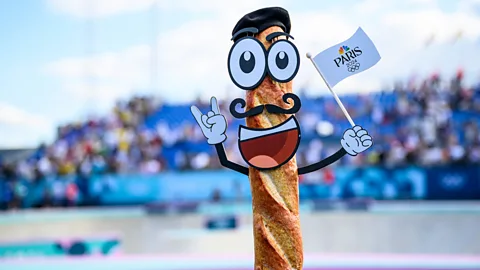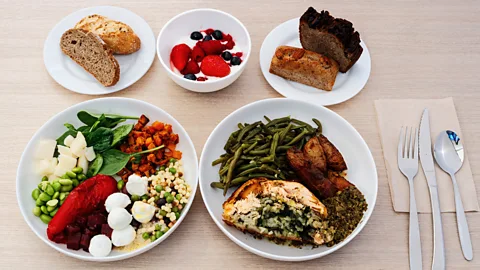The race to plant-based food: How the Paris Olympics became the most vegan ever
 Getty Images
Getty ImagesThe Paris Olympics' pledged to double the amount of plant-based food on offer. But prioritising planetary health alongside sporting prowess has involved balancing different interests.
Music, romance and regicide: the opening ceremony of the Paris Olympics was a riot of French passions. Among them was food, with a naked Dionysus, the Greek God of wine and festivity, sprawled with Bacchanalian abandon among a pile of produce. Another was revolution, taking the form of a gory Marie Antoinette, the beheaded 18th-Century queen, peering down from her historic former prison.
Recently however, these two French themes – of food and political fury – have combined, and dietary choices have become a source of intense and growing protest.
Early in 2024, hundreds of French farmers, angry about falling incomes and rising bureaucracy, took to their tractors to block major highways. "Mangez Francais", meaning "eat French", was spelled out in parked trucks, and dozens of protesters were arrested after attempting to besiege a food market outside the capital.
A few weeks later, a very different set of French food activists descended on the Louvre Museum within the city. Two members of the climate action collective Riposte Alimentaire (Food Retaliation) marched inside and sprayed pumpkin soup over the Mona Lisa. Their demands included the "right to healthy and sustainable food", and increased awareness of the toll on the planet taken by the food sector.
After a clean-up, the painting's famous smile remains as inscrutable as ever. Yet these battles over the future of food are neither new nor isolated, and have involved breaking a lot of eggs. Two years ago, it was cake that was hurled at the Mona Lisa as a protester urged people to "think of the Earth", while the farmers' protests have been taking place across Europe for over 12 months.
 Getty Images
Getty ImagesAdvocates from the two movements can often feel at odds, with calls to reduce emissions-intensive meat-eating clashing with the agricultural sector's demand for greater support for its animal products. Even the words used to describe plant-based meat alternatives have resulted in tension between the French government and the top administrative court.
Far from ignoring these controversies, however, the 2024 Olympic Games in Paris dived right in – and offered a different, more conciliatory approach. Instead of pitting environmental needs against farmers' interests, they have attempted to protect the concerns of both, via pledges to increase the meat-free options and boost the amount of French-sourced produce.
"You can't just say: 'We don't want any more burgers made of beef.' That's just not possible," says Philipp Wurz, the Paris Games' head of food. "You have to be a bit more polite and say 'Okay, I want to propose alternative solutions. I want to have both.' Because there will be some menus where we have this item, [and also some] that propose alternatives, like a chicken burger, and a vegan, or vegetarian burger.
"We got some feedback from the meat lobby, asking, 'Why are you doing this? Can you explain?' But when you remind them that we only purchase high-quality meat, then they accept the idea."
Vive la vegetarianism
Ahead of this year's games, the Paris hosts touted a new set of culinary priorities in an ambitious new Food Vision. Together with a goal of doubling the amount of plant-based food served at any other Olympics, Paris 2024 also promised to source 80% of products from within France, and 25% from within 250km (155 miles) of the venues. Thirty percent would be certified organic.
Most venues for spectators have served plant-based options as two-thirds of their offerings, says Wurz. In addition, for the first time in modern Olympic history, one stadium – the urban park at Place de la Concorde, hosting the skateboarding, breakdancing and BMX events –is entirely meat-free. The football stadiums, in contrast, have only been mandated to offer 40% plant-based food. Wurz says this is because they're largely based outside of Paris and have long-standing catering arrangements for matches.
Providing food for the Games has not been without challenges. At the event's start, athletes complained about the shortages of meat and eggs and the rationing of breakfast foods within the Olympic village dining halls. In its second week, British swimmer Adam Peaty also claimed worms had been found in food and that the general quality and quantity on offer was inadequate.
In an interview prior to the games, however, Wurz stressed that the 60% plant-based quota of food offerings was only applicable to venues serving spectators, and not to athletes inside the Olympic village. And a few days after the first reports of shortages, Valentine Serres, a spokeswoman for Sodexo Live!, the official catering partner in the Olympic village, told BBC Future Planet that all items were now "available in adequate quantities".
Medal Moments
Want to read more about the Olympics? Sign up for Medal Moments, your free global guide to Paris 2024, delivered daily to your inbox throughout the Games.
Despite athlete's provisions being outside the two-thirds plant-based target, around 30% of offerings inside competitors' food halls are vegetarian, says Wurz, and include veggie versions of beef-bourguignon and lasagne. But many different meat dishes are also on the menu: "It's impossible for us to impose on a foreign delegation a diet: athletes have their special diets and, as an organising committee, our main role is to ensure they feel at home".
So what did it take to establish these various goals? And do the targets go far enough in prioritising planetary health alongside sporting prowess?
 Getty Images
Getty ImagesAt the London Olympics in 2012, strides were already being made towards more eco-conscious catering. London's Food Vision required eggs to be 100% free-range, fish to be demonstrably sustainable and wild-caught, and milk sourced from organic-certified farms.
More than a decade on, numerous nations have since updated their national dietary guidelines to embrace the flexitarian diets that international scientific reviews recommend. In Germany, new advice counsels that the general public should consume at least 75% plant-based food.
The Paris Olympics have reflected this trend. By aiming to serve twice as much plant-based food, the catering offering is consistent with the Games' overarching ambition to cut carbon emissions by half compared to previous Olympics in Rio and London, Wurz says.
This goal involves each meal being produced with, on average, the equivalent of just 1kg of CO2 emissions. According to the Food Vision, this target is half the 2kg carbon footprint of meals served at previous Games, or around half that of the average person in France (just over 2kg per meal).
Further commitments in the detail of the Paris games' food plan include a pledge to halve the amount of protein from animal products in all food provided. In terms of dishes on offer, the result is an array of vegan and vegetarian options – such as green lentil dahl with coriander skyr, which, according to Sodexo Live! is the signature dish of the athletes village's executive chef Charles Guilloy.
 Getty Images
Getty ImagesBut even if all these promised forward strides are taken, are the Paris Olympics' food goals enough?
According to Jasmijn De Boo, chief executive of ProVeg International, a food awareness organisation, the target to serve twice as much plant-based food (than the average French person eats) is "very appropriate for an event in the global spotlight".
The goal is in keeping with France's trend towards meat reduction, De Boo points out, with a 2023 EU-funded Smart Protein report finding that France had the largest proportion of meat eaters who said that they reduced their meat intake during the previous year, with 18% reducing their consumption by 50% or more.
This also echoes the two-thirds plant-based catering goal set at 2023's Cop28 climate conference, as well as the 2024 Bonn Climate Conference's decision to serve mainly vegan food. Considering these were events specifically focused on reducing emissions, they would also have been expected "to go further than the sport-focused Paris Olympics", De Boo notes.
Fabrice DeClerck, science director at Eat, a non-profit specialising in transforming the global food system, also finds the Paris commitments "impressive", especially the decision to frame the goals in terms of "responsible" consumption.
Yet some think there is still room for improvement. DeClerck would have liked to have seen more specifics on cuts to red meat consumption. This is the biggest priority in terms of cutting carbon emissions, he explains, with the Eat Lancet commission's flexitarian diet recommending just 0-200g of red meat per week.
"Without being clear on whether the reduction they're proposing comes from red meat, then it's not clear how ambitious the Games are being," DeClerck says.
Paul Behrens, associate professor of environmental change at Leiden University in the Netherlands, notes that the Olympic targets don't go as far in promoting a plant-based diet as the national guidelines set by Germany, Spain or Denmark.
The food factor
For some athletes who've already embraced more plant-based diets, the change is welcome – but also could go further. According to Kate Strong, Britain's three-times world record-breaking cyclist, advocacy for dietary shifts would benefit from the "laser-focused attitude that people admire in athletes".
"I wish the Olympics, Paralympics and many other events unapologetically served plant-based food without having to justify it behind 'less carbon emissions,'" she says of the Paris approach. She suggests there are health benefits of a plant-based diet too, noting it can reduce footballers' oxidative stress (an imbalance in antioxidants in the body that can break down cell tissue), and another review into its advantages for endurance athletes, including improved cardiovascular protection.
Likewise, for Dotsie Bausch, a former US Olympic cyclist and founder of the non-profit Switch4Good, the Paris organisers could have done even more to educate people about the reasoning behind their targets. "I wish there was more education about the reasons why, not just sharing that targets have been set," she says. Personally, she "didn't want to be part of the killing and suffering and degradation of my planet".
Despite eating meat at almost every meal for 35 years, Bausch decided to make a change just before the 2012 Olympic Games – and credits the switch with helping achieve her silver medal.
"I made the change just before London 2012 Olympics […] and I wasn't expecting to see any performance enhancement, but I had a feeling inside that if I made sure I was getting the same micro- and macronutrients that I would thrive."
More like this:
• How pork-producing Denmark is trying to wean itself off meat
There are a range of plant-based foods on offer at the Games. Inside the athletes' village – for example, processed items are provided by the official partner Garden Gourmet, a plant-based meat-substitute firm, whose parent company is Nestlé, the largest publicly held food company in the world.
Nestlé, however, has been criticised over its failure to adequately support emissions reductions in animal agriculture. In a recent report, the Changing Markets Foundation, a UK campaign group, analysed what 22 of the largest global meat and dairy companies invest in low carbon solutions relative to what they spend on advertising. Where the data was available, it found that these companies' overall annual spending on research and development made up, on average, less than 1% of their latest revenues.
"It is commendable that Paris Olympics are offering healthier meals with more plant-based options, as part of the strategy to reduce the overall carbon footprint of the Games. However, as a parent company of Garden Gourmet, Nestlé desperately lacks a holistic approach to scaling up plant-based products," says Nusa Urbancic, Changing Markets' chief executive.
"Our analysis shows that despite some steps in the right direction, Nestlé still does not have a target to increase its sales of plant-based products, seeing it as a purely consumer driven market. This is a missed opportunity, as science clearly shows that the transition to plant-based products offers huge climate mitigation potential," says Urbancic.
In response, a Nestlé spokesperson says that several factors drive the growth of their plant-based offerings, including the taste of products and sustainability considerations. They also note their supply chain's reduction targets for greenhouse gas emissions from agriculture include a 20% absolute cut by 2025 and a 50% reduction by 2030 (from a 2018 baseline).
***
Despite the criticisms, the Paris games' food vision is a clear effort to better embed sustainability in international sporting events.
So even if the Olympics' plant-based ambitions aren't exactly racing at a record-breaking pace, they may yet earn a place on the podium.
--
For essential climate news and hopeful developments to your inbox, sign up to the Future Earth newsletter, while The Essential List delivers a handpicked selection of features and insights twice a week.

